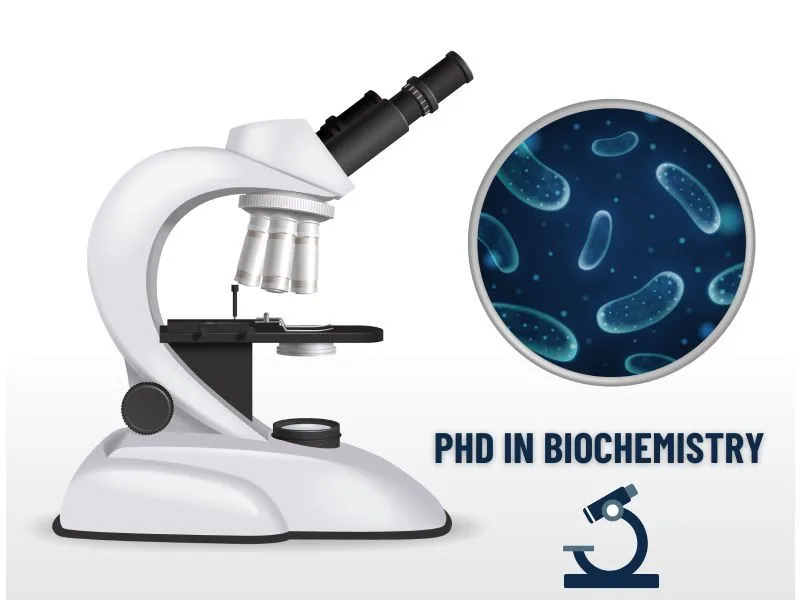A PhD in biochemistry is a research degree that focuses on studying living organisms and the chemical processes that occur within them. The aspirant who pursues a PhD admission 2025 will gain advanced knowledge in areas such as DNA, proteins, and enzymes. They will also learn how to conduct research. And develop new theories and ideas in biochemistry.
Candidates will take coursework in both chemistry. And biology, and they will also conduct original research. The research component of the degree is usually completed in the form of a dissertation, which is a written document that presents the findings of the student’s research.
An Overview of a PhD in Biochemistry
A PhD in biochemistry is a research degree that focuses on studying living organisms and their chemical processes. It includes the study of DNA, proteins, carbohydrates, and lipids. PhD students in biochemistry will often conduct research in laboratories. And use techniques such as genetic engineering, molecular biology, and immunology.
The program typically takes 4-5 years to complete and includes coursework, research, and a dissertation. A PhD in biochemistry can open up opportunities in teaching at the collegiate level, working in a private research lab, or conducting government-funded research.
A biochemistry PhD admission 2025 in India can lead to a career in academia. As well as in government or industry.

Types of courses in a PhD in Biochemistry
These include courses on topics like research methods, biochemistry and cell biology, pharmacology, and more. You will also be able to take elective courses in other areas. Such as chemistry, physics, or biology. The exact courses that you take will depend on the specific program that you choose.
It also covers organic chemistry, cell biology, and immunology topics.
You will also have the opportunity to take courses on more specific topics like drug design or cancer
research. By taking various courses, you will gain the skills and knowledge necessary to pursue a career in this field.
A PhD in Biochemistry typically requires the completion of four types of courses:
1. Research – Research courses focus on developing the skills necessary to conduct original research in Biochemistry.
2. Teaching – Teaching courses prepare students to teach Biochemistry at the collegiate level.
3. Theory – Theory courses cover the history and philosophy of Biochemistry.
4. Lab – Lab courses provide students with experience working in a Biochemistry laboratory.

A PhD in Biochemistry requires the completion of several courses.
The first step is to complete an undergraduate degree in biochemistry.
Once this is done, the next step is to take a qualifying exam.
This exam tests the student’s knowledge of the subject matter. After passing the exam, the scholars can begin taking courses toward their PhD Admission 2025 in India.
These courses include research methods, advanced biochemistry, and more.
Application process
1. A PhD in Biochemistry typically takes four to five years to complete.
2. The first step is to find a supervisor who will oversee your research.
3. Next, you will take a qualifying exam to show that you are knowledgeable in biochemistry.
4. After that, you will complete your dissertation and defend it before a committee.
5. Finally, you will submit your dissertation to a journal for publication.

Career prospects for a PhD in Biochemistry:
1. A PhD in Biochemistry can prepare you for many different types of careers. One popular career is teaching at the college level.
2. With your PhD Degree, you could teach advanced courses in biochemistry and other related subjects. You could also work in a research lab, either in academia or for a pharmaceutical company.
3. You would use your skills to design and carry out experiments and analyze the results.
4. Some people go into research and development, working in labs to develop new drugs and treatments. Others choose to teach at the collegiate level, sharing their knowledge with the next generation of students.
5. There are also many opportunities for those with a PhD in Biochemistry to work in the food. And beverage industry, developing new ways to make food healthier or more sustainable.
6. No matter your path, a PhD admission can lead to a rewarding and fulfilling career.
A PhD in biochemistry can open up a world of exciting opportunities for you. With this advanced degree, you’ll be able to work in various settings, from government labs to private companies. You’ll also have the chance to conduct cutting-edge research and make discoveries. That could change the way we think about the world around us. If you’re passionate about science and want to make a difference, a PhD in biochemistry could be a perfect choice. You may also complete your biochemistry through Aimlay. Our experts will help you in your every process from PhD admission to Completion.
Frequently Asked Questions




